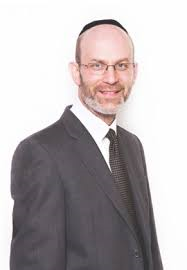
By Leon Symons
It’s one of the great battlefields of life – parents versus children.
They’re our little darlings, our bubelahs, the apples of our eyes and we love them to bits.
But then they begin to grow and as they do, they realise they have special powers – powers that can reduce parents to a haggard, quivering mess.
Now those days might just be over, courtesy of a new book written by parenting expert Rabbi Malcolm Herman. He will also be writing a regular parenting column, the first of which is to be found elsewhere in the paper.
They’re our little darlings, our bubelahs, the apples of our eyes and we love them to bits.
But then they begin to grow and as they do, they realise they have special powers – powers that can reduce parents to a haggard, quivering mess.
Now those days might just be over, courtesy of a new book written by parenting expert Rabbi Malcolm Herman. He will also be writing a regular parenting column, the first of which is to be found elsewhere in the paper.
There are, in my humble opinion, a handful of life experiences for which there is no training.
Marriage is one, the death of a close relative another.
There is a third – children.
The blessing of having a child, or multiple children, brings with it a whole array of new challenges that can, potentially, have mother and father tearing their hair out – and even each other’s.
That is where Rabbi Malcolm Herman steps up to the plate.
Rabbi Herman is associate national director of adult and family educational organisation seed. He has just published a new book called “Everyday Parenting for Everyday Parents”, written with Prof Irvine Gersch, emeritus professor of educational and child psychology at the University of East London.
While men have written numerous books on the subject, seeing one penned primarily by a rabbi is something unusual.
So what was the genesis, as it were, of this particular volume?
It all goes back to seed, at which Rabbi Hermon arrived in 2001.
“We perceived that parents needed two sets of skills – one of Jewish knowledge and one of parenting skills,” he says. “That is how we began to think about providing these things to contemporary parents in the modern world.
“Then there is the Jewish approach to parenting, which has different nuances to a general approach.”
A decade ago, Rabbi Herman says he was “persuaded” to start giving a couple of talks on parenting “to see how it goes”. He read some books, undertook some research and spoke to various people.
“We developed our own course and our style,” he says.
Once that had become established and had been operating successfully for a number of years, the next step was the book, which encapsulates the sessions of the course in an easy-to-read form. The title reflects the fact that “our team are educators and not psychotherapists,” he says.
“We call ourselves parental educators. We want to give parents the tools to handle everyday parenting situations. We shouldn’t have to be psychoanalysts to be good parents.”
To that end, the book starts with what Rabbi Herman regards as one of its crucial tenets:
the five tools of parenting.
They bear reproducing here:
1. Boundaries create more space for love
2. Empower often, impose rarely
3. No-one can hear until they have been heard
4. Unique not uniform creates greatness
5. Live the message
In the first session, he explains the rationale behind each tool in straightforward terms, so that the reader understands and follows with ease. There are scenarios, examples of situations that parents face day in and day out and how to resolve them to produce the best possible outcome for both parent and child.
The next session is titled “Believing in myself”, followed by “Believing in my child”; “Tantrum tactics”; “Sibling rivalry” and finally “Incentives and deterrents”.
The eye is drawn to “Tantrums and tactics” which begins: “A tantrum is best described as an emotional meltdown. We could be in the middle of a supermarket and we have just said no to a chocolate bar waving tantalisingly from the shelves. Our three-year-old has an “emotional meltdown”.
“They throw themselves on the floor, kicking and screaming as little old women walk past tutting and muttering about how badly behaved children are today.”
It’s a familiar scenario to arguably millions of parents around the world. Rabbi Herman and Prof Gersch deconstruct the event, even quoting from King Solomon, to provide parents with a path to a more peaceful existence.
The book is packed with pearls of wisdom that will help parents through all the difficult times and will put a smile on their faces as they progress through it.
At the end of every session is a page of Torah thoughts on it together with the thoughts of Prof Gersch providing a summary of what has gone before. “I thought it was very important to have his perspective, especially as we were putting something in print,” says Rabbi Herman.”
Parents can participate in written exercises, to cement what they’ve been reading. The sessions are also punctuated by cartoons commissioned specially from cartoonist Peter Strauli.
“It’s a combination of Jewish wisdom, contemporary psychology and humour. It was very important to have cartoons in the book because we need to have humour to survive the crises of being a parent. They capture everyday situations,” says Rabbi Herman.
Rabbi Herman enjoys another qualification for the role of parent guide. He has four children himself, aged 15, twins of 12 and a 10-year-old.
He said the first session had engendered some debate, putting parents’ belief in themselves ahead of belief in their children.
“Many parents today find it challenging to set appropriate boundaries, so the book begins with the skills needed to set them. Then it moves on to developing with children to have a healthy self-esteem.
“The first session is about discipline while the second session deals with love. We did have discussions about the sequence but I believe strongly in our first tool that boundaries create the space for love, more time for love and for fun and laughter. Parents who have been on the course feel empowered the bring more love into their homes.”
Much of the thrust of the book is about showing parents that their experiences are shared and that they are not alone in their respective trials and tribulations.
Rabbi Herman paid tribute to his co-author, Prof Gersch. “It was a great privilege to work with him. He has written and lectured on this topic and written five books. He shared his experience in helping to review the material. He reviewed each chapter and made many suggestions. He brings research to back up what’s in each chapter.
“The professor says there is no prescription because every parent and home is different. We were anxious not to write something prescriptive but to give parents tools to help them.
“In a way, the book blends two disciplines – the Torah way of thinking and psychology. I felt that blend was very important.”
The Torah inspiration is the centrality of the family in Judaism – the molecular structure of the Jewish nation, says Rabbi Herman.
“When the Jewish people broke free on seder night, they were not in a square in Cairo waving banners, they were in their homes having seder nights with their families.
“In the Aseret Hadibrot, there is a mitzvah to honour your parents. But only a parent can teach a child to honour their parents.
“There is a very important idea, the belief that every child has a neshamah, a unique soul and we are the custodians of that soul. We have been entrusted by the Almighty to guard that soul. That’s a very beautiful idea.”
Marriage is one, the death of a close relative another.
There is a third – children.
The blessing of having a child, or multiple children, brings with it a whole array of new challenges that can, potentially, have mother and father tearing their hair out – and even each other’s.
That is where Rabbi Malcolm Herman steps up to the plate.
Rabbi Herman is associate national director of adult and family educational organisation seed. He has just published a new book called “Everyday Parenting for Everyday Parents”, written with Prof Irvine Gersch, emeritus professor of educational and child psychology at the University of East London.
While men have written numerous books on the subject, seeing one penned primarily by a rabbi is something unusual.
So what was the genesis, as it were, of this particular volume?
It all goes back to seed, at which Rabbi Hermon arrived in 2001.
“We perceived that parents needed two sets of skills – one of Jewish knowledge and one of parenting skills,” he says. “That is how we began to think about providing these things to contemporary parents in the modern world.
“Then there is the Jewish approach to parenting, which has different nuances to a general approach.”
A decade ago, Rabbi Herman says he was “persuaded” to start giving a couple of talks on parenting “to see how it goes”. He read some books, undertook some research and spoke to various people.
“We developed our own course and our style,” he says.
Once that had become established and had been operating successfully for a number of years, the next step was the book, which encapsulates the sessions of the course in an easy-to-read form. The title reflects the fact that “our team are educators and not psychotherapists,” he says.
“We call ourselves parental educators. We want to give parents the tools to handle everyday parenting situations. We shouldn’t have to be psychoanalysts to be good parents.”
To that end, the book starts with what Rabbi Herman regards as one of its crucial tenets:
the five tools of parenting.
They bear reproducing here:
1. Boundaries create more space for love
2. Empower often, impose rarely
3. No-one can hear until they have been heard
4. Unique not uniform creates greatness
5. Live the message
In the first session, he explains the rationale behind each tool in straightforward terms, so that the reader understands and follows with ease. There are scenarios, examples of situations that parents face day in and day out and how to resolve them to produce the best possible outcome for both parent and child.
The next session is titled “Believing in myself”, followed by “Believing in my child”; “Tantrum tactics”; “Sibling rivalry” and finally “Incentives and deterrents”.
The eye is drawn to “Tantrums and tactics” which begins: “A tantrum is best described as an emotional meltdown. We could be in the middle of a supermarket and we have just said no to a chocolate bar waving tantalisingly from the shelves. Our three-year-old has an “emotional meltdown”.
“They throw themselves on the floor, kicking and screaming as little old women walk past tutting and muttering about how badly behaved children are today.”
It’s a familiar scenario to arguably millions of parents around the world. Rabbi Herman and Prof Gersch deconstruct the event, even quoting from King Solomon, to provide parents with a path to a more peaceful existence.
The book is packed with pearls of wisdom that will help parents through all the difficult times and will put a smile on their faces as they progress through it.
At the end of every session is a page of Torah thoughts on it together with the thoughts of Prof Gersch providing a summary of what has gone before. “I thought it was very important to have his perspective, especially as we were putting something in print,” says Rabbi Herman.”
Parents can participate in written exercises, to cement what they’ve been reading. The sessions are also punctuated by cartoons commissioned specially from cartoonist Peter Strauli.
“It’s a combination of Jewish wisdom, contemporary psychology and humour. It was very important to have cartoons in the book because we need to have humour to survive the crises of being a parent. They capture everyday situations,” says Rabbi Herman.
Rabbi Herman enjoys another qualification for the role of parent guide. He has four children himself, aged 15, twins of 12 and a 10-year-old.
He said the first session had engendered some debate, putting parents’ belief in themselves ahead of belief in their children.
“Many parents today find it challenging to set appropriate boundaries, so the book begins with the skills needed to set them. Then it moves on to developing with children to have a healthy self-esteem.
“The first session is about discipline while the second session deals with love. We did have discussions about the sequence but I believe strongly in our first tool that boundaries create the space for love, more time for love and for fun and laughter. Parents who have been on the course feel empowered the bring more love into their homes.”
Much of the thrust of the book is about showing parents that their experiences are shared and that they are not alone in their respective trials and tribulations.
Rabbi Herman paid tribute to his co-author, Prof Gersch. “It was a great privilege to work with him. He has written and lectured on this topic and written five books. He shared his experience in helping to review the material. He reviewed each chapter and made many suggestions. He brings research to back up what’s in each chapter.
“The professor says there is no prescription because every parent and home is different. We were anxious not to write something prescriptive but to give parents tools to help them.
“In a way, the book blends two disciplines – the Torah way of thinking and psychology. I felt that blend was very important.”
The Torah inspiration is the centrality of the family in Judaism – the molecular structure of the Jewish nation, says Rabbi Herman.
“When the Jewish people broke free on seder night, they were not in a square in Cairo waving banners, they were in their homes having seder nights with their families.
“In the Aseret Hadibrot, there is a mitzvah to honour your parents. But only a parent can teach a child to honour their parents.
“There is a very important idea, the belief that every child has a neshamah, a unique soul and we are the custodians of that soul. We have been entrusted by the Almighty to guard that soul. That’s a very beautiful idea.”









